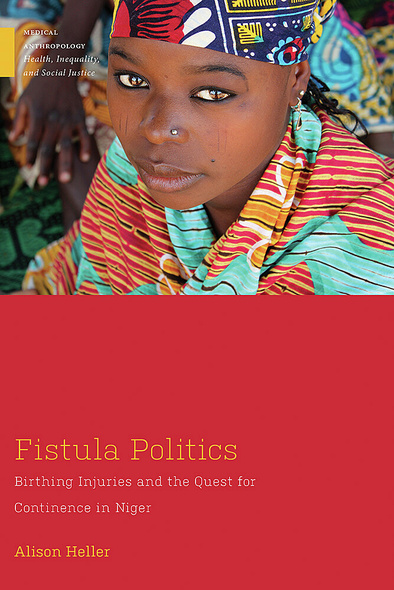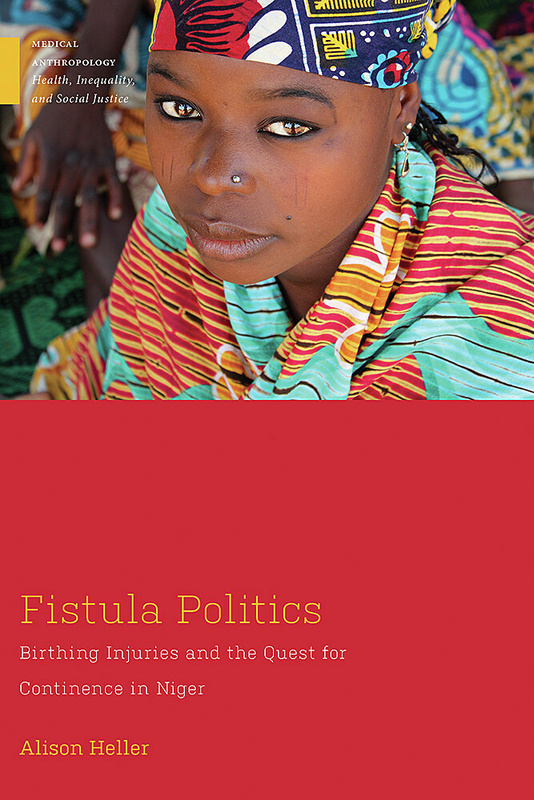
270 pages, 6 x 9
25 color and B-W photos
Paperback
Release Date:15 Oct 2018
ISBN:9781978800366
Hardcover
Release Date:15 Oct 2018
ISBN:9781978800373
Fistula Politics
Birthing Injuries and the Quest for Continence in Niger
SERIES:
Medical Anthropology
Rutgers University Press
Obstetric fistula is a birthing injury caused by prolonged obstructed labor that results in urinary and fecal incontinence. It is nearly non-existent in the Global North. In contrast Niger, in West Africa, has one of the highest rates of fistula in the world. In Western humanitarian and media narratives, fistula is presented as deeply stigmatizing, resulting in divorce, abandonment by kin, exile from communities, depression and suicide. In Fistula Politics, Alison Heller illustrates the inaccuracy of these popular narratives and shows how they serve the interests not of the women so affected, but of humanitarian organizations, the media, and local clinics.
Alison Heller has transformed the discourse on fistula with her brilliantly detailed ethnography of the lives of affected women in Niger. Fistula Politics is an inspiring account of the real lives of determined women facing the hardships of birthing injuries: pregnancy losses and social suffering, persistent wetness and months-long waiting for treatment in the context of 'regional poverty' and mismanaged care. Transformed my understanding! Truly brilliant!
Most of us know the 'fistula narrative,' a story of innocent girls who suffer the dreadful consequences of early childbearing and can be saved through a simple biomedical intervention. Ali Heller’s evocative and meticulously empirical book reveals the complexities that this sensational narrative fails to capture. The alternative accounts told here raise vital questions about fistula’s true causes, consequences, cures, and costs—and about the marketing of humanitarian biomedicine.
Chronicle of Higher Education new scholarly books weekly book list,' by Nina C. Ayoub
A recommended read for scholars and practitioners in global public health, international development and medical anthropology.
Fistula Politics is a highly readable, teachable, and beautifully illustrated monograph that is grounded in careful empirical observation. The book is elegantly organized and could be taught in undergraduate and graduate courses in medical anthropology or sociology, global health, human reproduction, gender studies, human rights, or research methods.
Fistula Politics is a richly-documented ethnography of Nigerian women's reproductive lives...Compellingly illustrates the value of anthropology as it provides us with an ethnographically-based, yet comprehensive and holistic, insight into people's lived experiences.'
Fistula Politics is written in clear, accessible language. I expect it will be widely read not only by medical anthropologists and gender and sexuality studies specialists but also by the very actors who intervene in preventing and repairing fistula.
Heller’s ethnography, Fistula Politics, is a welcome addition to ethnographic studies of fistula, biomedicine, and the body.
Alison Heller has transformed the discourse on fistula with her brilliantly detailed ethnography of the lives of affected women in Niger. Fistula Politics is an inspiring account of the real lives of determined women facing the hardships of birthing injuries: pregnancy losses and social suffering, persistent wetness and months-long waiting for treatment in the context of 'regional poverty' and mismanaged care. Transformed my understanding! Truly brilliant!
Most of us know the 'fistula narrative,' a story of innocent girls who suffer the dreadful consequences of early childbearing and can be saved through a simple biomedical intervention. Ali Heller’s evocative and meticulously empirical book reveals the complexities that this sensational narrative fails to capture. The alternative accounts told here raise vital questions about fistula’s true causes, consequences, cures, and costs—and about the marketing of humanitarian biomedicine.
Chronicle of Higher Education new scholarly books weekly book list,' by Nina C. Ayoub
A recommended read for scholars and practitioners in global public health, international development and medical anthropology.
Fistula Politics is a highly readable, teachable, and beautifully illustrated monograph that is grounded in careful empirical observation. The book is elegantly organized and could be taught in undergraduate and graduate courses in medical anthropology or sociology, global health, human reproduction, gender studies, human rights, or research methods.
Fistula Politics is a richly-documented ethnography of Nigerian women's reproductive lives...Compellingly illustrates the value of anthropology as it provides us with an ethnographically-based, yet comprehensive and holistic, insight into people's lived experiences.'
Fistula Politics is written in clear, accessible language. I expect it will be widely read not only by medical anthropologists and gender and sexuality studies specialists but also by the very actors who intervene in preventing and repairing fistula.
Heller’s ethnography, Fistula Politics, is a welcome addition to ethnographic studies of fistula, biomedicine, and the body.
Alison Heller is an assistant professor of anthropology at the University of Maryland in College Park.
Contents
Note on Terminology
List of Abbreviations
Foreword
1 Chapter 1: Incontinence and Inequalities
44 Part I Living Incontinence
45 Laraba’s Story
53 Chapter 2: Fistula Stigma
96 Chapter 3: Liminal Wives
143 Part II Clinical Encounters
144 Six Beds, Sixty Minutes
153 Chapter 4: The “Worst Place to be a Mother”
193 Chapter 5: The Indeterminable Wait
234 Part III The Marketplace of Victimhood
235 Arantut’s Story
241 Chapter 6: Superlative Sufferers
271 Chapter 7: Costs and Consequences
299 Chapter 8: The Threshold of Continence
Appendix
Acknowledgments
Notes
Bibliography
Index
Note on Terminology
List of Abbreviations
Foreword
1 Chapter 1: Incontinence and Inequalities
44 Part I Living Incontinence
45 Laraba’s Story
53 Chapter 2: Fistula Stigma
96 Chapter 3: Liminal Wives
143 Part II Clinical Encounters
144 Six Beds, Sixty Minutes
153 Chapter 4: The “Worst Place to be a Mother”
193 Chapter 5: The Indeterminable Wait
234 Part III The Marketplace of Victimhood
235 Arantut’s Story
241 Chapter 6: Superlative Sufferers
271 Chapter 7: Costs and Consequences
299 Chapter 8: The Threshold of Continence
Appendix
Acknowledgments
Notes
Bibliography
Index





